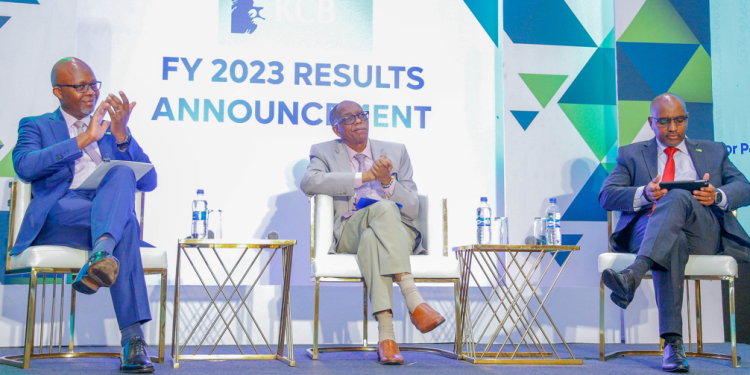
From Left: KCB Group, Finance Director, Lawrence Kimathi, Group Chairman, Dr. Joseph Kinyua and Group CEO, Paul Russo exchange notes during the release of the 2023 Full Year Financial results.
KCB Group recorded a decline in net profit in 2023 with the lender linking the performance to bad debt and other costs.
The ratio of non-performing loans (NPLs) dropped to 16.6 per cent due to loan book growth, down from 17.3 per cent.
KCB’s assets crossed the Kshs. 2 trillion mark to Kshs. 2.17 trillion, primarily driven by increased customer deposits. Revenues increased to KShs 165.2 billion, while net interest income increased by 23.9 per cent.
“Focus remained on robust cost management to give us room to invest in initiatives to drive growth and put the Group on a strong pedestal for better growth in 2024, supported by strong capital and liquidity buffers,” Paul Russo, Group CEO said.
According to KCB’s financials, shareholders funds rose to KShs. 236.4 billion from KShs 206.3 billion in 2022. The banking group has paid Kshs. 19 bn in assets since 2020, but it did not declare a dividend for 2023.
The lender’s subsidiaries outside of Kenya now account for 36.7% of its profitability. Although the Kenyan units are still profitable and contributed the highest proportion of customer deposits, their health has been dampened by multiple factors, including a large stock of non-performing loans.
The banking group closed the year with a stock of gross NPLs worth KShs. 208.3 billion. Provisions increased by 154.7% primarily because of the NPLs and the Kenya shilling’s foreign exchange fluctuations.
This rapid rise in provisions is not a surprise to investors in Kenya’s banking sector, but the value of KCB’s NPLs and provisions may dampen the lender’s returns in the short term.
KCB’s major issue is its subsidiary National Bank of Kenya (NBK), which it bought in 2019. With its branch network, assets, and history, KCB also acquired a litany of issues including a large stock of non-performing loans and expensive ongoing litigation. In 2023, NBK was the only KCB subsidiary that did not meet its capital requirements. It also accounted for 25.3% of the group’s non performing loans.
KCB’s decision to sell NBK is a good sign to investors that it is realistic to its chances of turning it around any more than it has in the last four years. On Wednesday, KCB signed a binding offer with Nigerian lender Access Bank to sell the struggling subsidiary.
While the growing contribution of profitability by subsidiaries outside Kenya cushioned the group from its woes at home, it also means that the Kenyan unit is likely to be a major focus of its 2024 strategy. While KCB Group’s huge debt portfolio is attributable to NBK, the group’s unit in Kenya accounted for 81% of the increase in provisions. It also accounted for 20.4% of its non-performing loans, second to NBK.
NBK will continue to eat into KCB Group’s performance for most of 2024, as the deal will take six to nine months to complete.
“Looking ahead, it is expected that the region will continue to see heightened economic pressures in the medium term,” said KCB Group Chairman Joseph Kinyua, “Our focus into the future is to position the entities outside Kenya as anchor support channels for our Pan-African expansion agenda while delivering on our overall growth agenda.”
Its foray into the DRC is still nascent, and the banking group, now present in seven countries in the region, is betting on facilitating regional trade, excising NBK from its portfolio, and launching new products to boost its fortunes. It is likely to spend 2024 working to correct course, which may dampen short-term investor interest amidst economic pressures.







